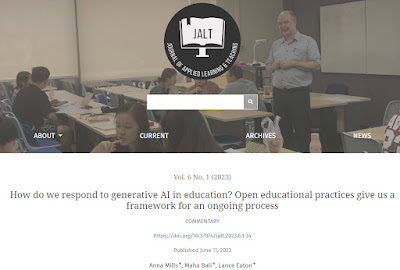New Co-Authored Article on Generative AI & Open Educational Practices
Estimated Reading Time: 4 minutes
I've known for a while that I'm better when in conversation with others than just talking to myself; we probably all are. In fact, this blog and social media in general continue to be a place where co-learn, co-develop new ideas, and find collaborators. And I'm lucky to be in regular conversation with folks through work, social media, and the friends and colleagues I've accumulated over the years. This has led to co-facilitated workshops, conference presentations, and publications like this piece on digital service learning with Danielle Leek and this piece on inclusive practices when teaching an online popular culture course at a community college with Alex Rockey.
Recently, through the luck and kindness of Anna Mills, I was invited into a conversation with her and Maha Bali around open educational practices as a means of navigating generative AI. Anna has been a strong, thoughtful, generous, and nuanced voice within the discussion of generative AI over the last 7 months. I've been grateful to learn from her in myriad ways. I have been following and reading Maha for years now and she continues to be a person I look to learn from, emulate, and deeply appreciate for her openness of thoughts, process, and ideas that she continues to share. To be in collaboration with both of them is so gosh-darn amazing and I cannot explain how awed I am.
Our work has resulted in this publication: How do we respond to generative AI in education? Open educational practices give us a framework for an ongoing process. This piece captured a lot of the innate practices that Maha, Anna, and myself relied on (which also put us into conversation across different social media platforms in the past 6 months) and we were so grateful for the support and encouragement from the Journal of Applied Learning and Teaching, particularly from the editor, Dr. Juergen Rudolph, for seeing the importance and value of the piece.
Here is the abstract for further details: "With the release of ChatGPT in November 2022, the field of higher education rapidly became aware that generative AI can complete or assist in many of the kinds of tasks traditionally used for assessment. This has come as a shock, on the heels of the shock of the pandemic. How should assessment practices change? Should we teach about generative AI or use it pedagogically? If so, how? Here, we propose that a set of open educational practices, inspired by both the Open Educational Resources (OER) movement and digital collaboration practices popularized in the pandemic, can help educators cope and perhaps thrive in an era of rapidly evolving AI. These practices include turning toward online communities that cross institutional and disciplinary boundaries. Social media, listservs, groups, and public annotation can be spaces for educators to share early, rough ideas and practices and reflect on these as we explore emergent responses to AI. These communities can facilitate crowdsourced curation of articles and learning materials. Licensing such resources for reuse and adaptation allows us to build on what others have done and update resources. Collaborating with students allows emergent, student-centered, and student-guided approaches as we learn together about AI and contribute to societal discussions about its future. We suggest approaching all these modes of response to AI as provisional and subject to reflection and revision with respect to core values and educational philosophies. In this way, we can be quicker and more agile even as the technology continues to change.
We give examples of these practices from the Spring of 2023 and call for recognition of their value and for material support for them going forward. These open practices can help us collaborate across institutions, countries, and established power dynamics to enable a richer, more justly distributed emerging response to AI."
You can access the PDF here and I look forward to hearing your thoughts! Additionally, if you want to hear more from the students that were involved in this project, you can check out this blog interview and podcast that we have been featured in recently as well.
Did you enjoy this read? Let me know your thoughts down below or feel free to browse around and check out some of my other posts!. You might also want to keep up to date with my blog by signing up for them via email.
 This work is licensed under a Creative Commons Attribution-ShareAlike 4.0 International License.
This work is licensed under a Creative Commons Attribution-ShareAlike 4.0 International License.

Comments
Post a Comment